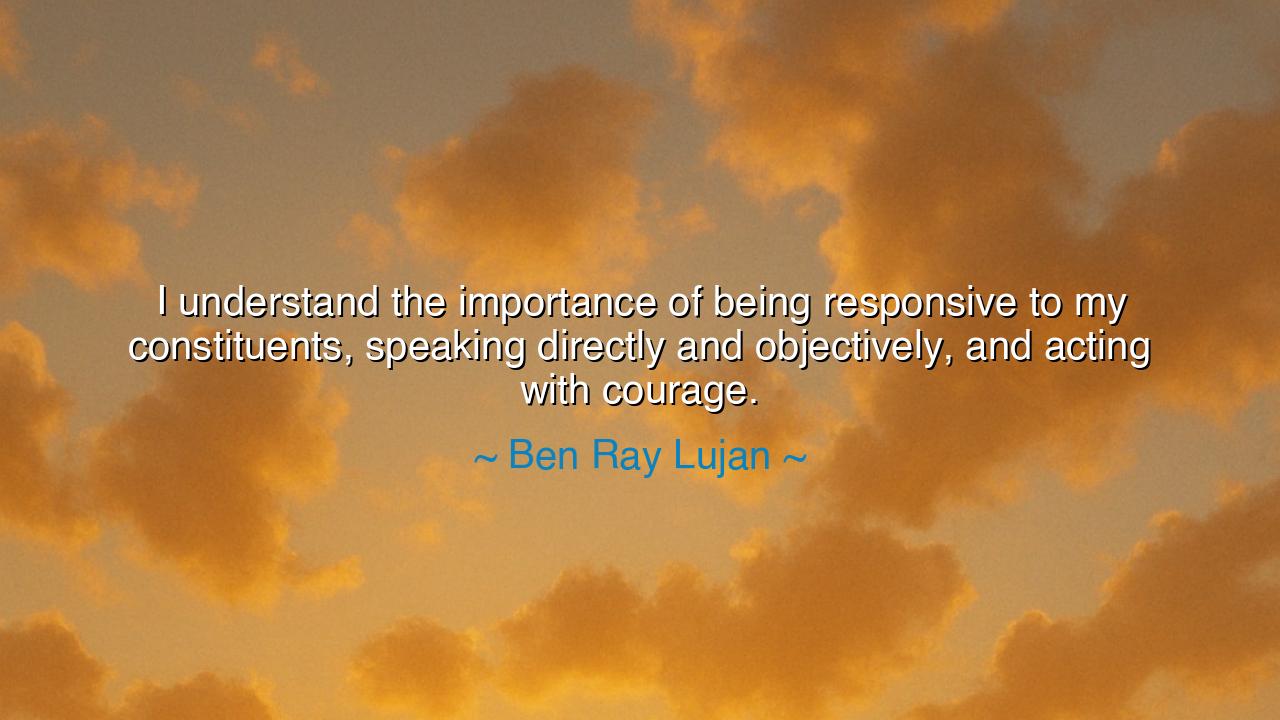
I understand the importance of being responsive to my
I understand the importance of being responsive to my constituents, speaking directly and objectively, and acting with courage.






The statesman Ben Ray Luján, in speaking these words, revealed not only a creed of governance but a timeless philosophy of service: “I understand the importance of being responsive to my constituents, speaking directly and objectively, and acting with courage.” Though born of political life, this declaration resounds with the voice of moral duty and human honor. For what he describes is not merely the role of a public servant, but the sacred responsibility of all who bear the trust of others—to listen, to speak truthfully, and to act bravely when silence would be easier. Within this short statement lies the essence of leadership as understood by the ancients: a harmony of wisdom, honesty, and courage in the service of the common good.
The origin of these words reflects Luján’s character as a son of New Mexico and a servant of his people. Raised among communities bound by tradition, hard work, and mutual respect, he learned that leadership begins not with power, but with responsiveness—the ability to hear the voice of the people, not as an echo, but as a call to action. In a world where many speak to be heard, the true leader listens to understand. This ancient virtue, long praised by philosophers and prophets alike, lies at the heart of all just rule. For the ruler who ceases to listen becomes a tyrant, but the one who listens deeply becomes the steward of the people’s hopes.
To be responsive is not merely to answer, but to connect—to sense the needs, fears, and aspirations of others and to act with empathy and purpose. This is the art that once defined the great leaders of the past. Consider Pericles of Athens, who ruled not through domination but persuasion, guiding his people by understanding their will and refining it through wisdom. Or Abraham Lincoln, who, amid the fires of civil war, opened his heart to both allies and enemies, understanding that leadership requires not only decision but compassion. Their greatness lay not in command, but in communion with their people—the very quality that Luján names as responsiveness.
Yet Luján’s words do not stop at listening. He speaks also of speaking directly and objectively, virtues rare in any age. To speak directly is to speak with truth, unadorned by deceit or flattery; to speak objectively is to speak with reason, guided not by vanity or emotion, but by justice. The ancients revered such clarity of speech. They called it parrhesia—the fearless truth-telling of the citizen to power, and of the leader to the people. The one who speaks directly honors both truth and those who hear it. For the leader who hides behind rhetoric betrays trust, but the one who speaks plainly builds the foundation of unity.
Still, it is the final phrase—“acting with courage”—that gives the statement its heartbeat. For all listening and speaking are empty unless they lead to action. To act with courage is to move when others hesitate, to choose what is right when it is unpopular, to stand firm when storms of criticism and fear rise around you. The ancients taught that courage is the root of all virtue, for without it, none of the others can live. The philosopher Seneca wrote that courage is not the absence of fear, but the mastery of it for the sake of duty. A leader without courage is a reed before the wind, but a leader with courage becomes the oak that shelters the people beneath its branches.
History is filled with examples of those who embodied this triad of virtues—responsiveness, honesty, and courage. Consider Eleanor Roosevelt, who listened to the cries of the poor and the oppressed, spoke truth to the powerful, and acted with unyielding bravery in the face of scorn. She too understood that to serve the people is not to seek applause, but to stand by principle when others fall away. Her life, like Luján’s words, reminds us that leadership is not a crown but a cross, to be carried with humility and conviction.
From these words of Luján, a lesson emerges not only for rulers but for all souls. Each of us, in our own sphere—be it home, community, or nation—has those who depend upon our integrity. To live nobly is to be responsive to their needs, to speak truthfully even when lies are easier, and to act with courage when fear tempts us to inaction. The world does not need more voices of ambition; it needs more hearts of service. Begin, therefore, where you are: listen more deeply, speak more honestly, and act more bravely. These are not only the duties of leaders—they are the duties of the human spirit.
Thus, Ben Ray Luján’s declaration endures as a modern echo of ancient wisdom: that true strength lies not in dominion, but in service; not in words, but in truth; not in comfort, but in courage. Let his example remind you that leadership—whether of a nation, a family, or a single soul—is a sacred trust. And if you carry it with responsiveness, honesty, and courage, then you too will walk the path of the just, leaving behind a legacy that no time or tide can erase.






AAdministratorAdministrator
Welcome, honored guests. Please leave a comment, we will respond soon